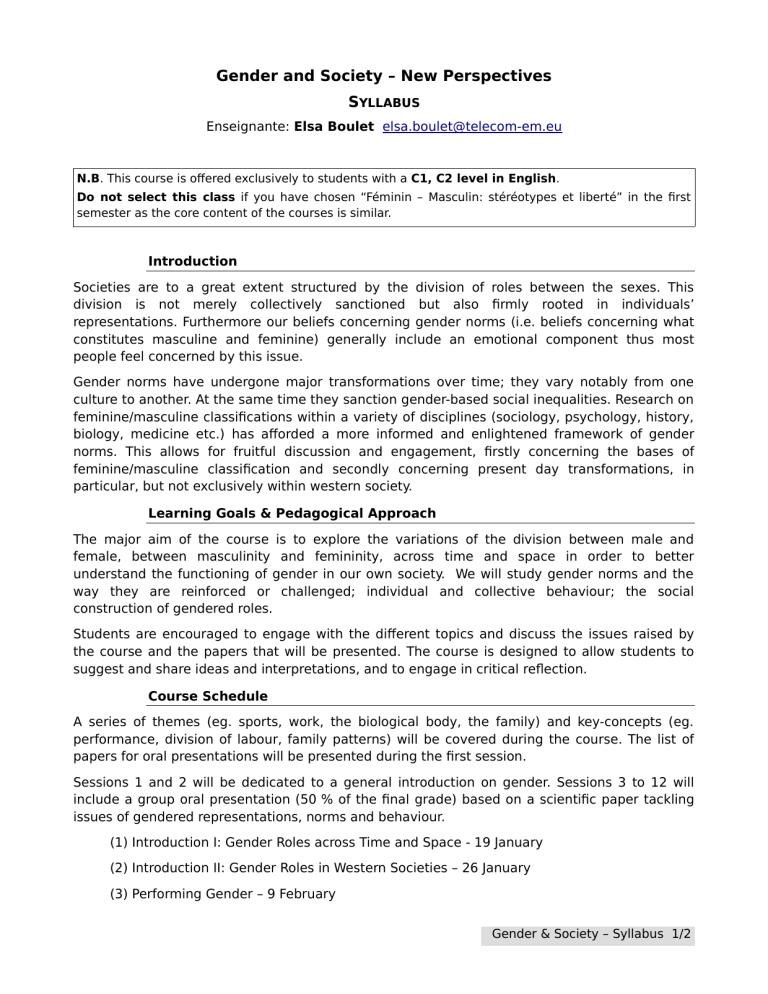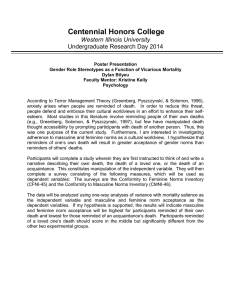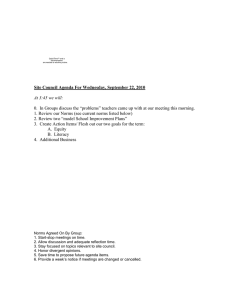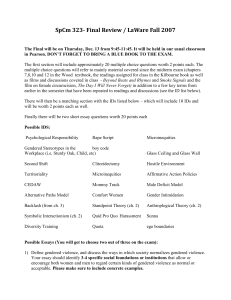
Gender and Society – New Perspectives SYLLABUS Enseignante: Elsa Boulet elsa.boulet@telecom-em.eu N.B. This course is offered exclusively to students with a C1, C2 level in English. Do not select this class if you have chosen “Féminin – Masculin: stéréotypes et liberté” in the first semester as the core content of the courses is similar. Introduction Societies are to a great extent structured by the division of roles between the sexes. This division is not merely collectively sanctioned but also firmly rooted in individuals’ representations. Furthermore our beliefs concerning gender norms (i.e. beliefs concerning what constitutes masculine and feminine) generally include an emotional component thus most people feel concerned by this issue. Gender norms have undergone major transformations over time; they vary notably from one culture to another. At the same time they sanction gender-based social inequalities. Research on feminine/masculine classifications within a variety of disciplines (sociology, psychology, history, biology, medicine etc.) has afforded a more informed and enlightened framework of gender norms. This allows for fruitful discussion and engagement, firstly concerning the bases of feminine/masculine classification and secondly concerning present day transformations, in particular, but not exclusively within western society. Learning Goals & Pedagogical Approach The major aim of the course is to explore the variations of the division between male and female, between masculinity and femininity, across time and space in order to better understand the functioning of gender in our own society. We will study gender norms and the way they are reinforced or challenged; individual and collective behaviour; the social construction of gendered roles. Students are encouraged to engage with the different topics and discuss the issues raised by the course and the papers that will be presented. The course is designed to allow students to suggest and share ideas and interpretations, and to engage in critical reflection. Course Schedule A series of themes (eg. sports, work, the biological body, the family) and key-concepts (eg. performance, division of labour, family patterns) will be covered during the course. The list of papers for oral presentations will be presented during the first session. Sessions 1 and 2 will be dedicated to a general introduction on gender. Sessions 3 to 12 will include a group oral presentation (50 % of the final grade) based on a scientific paper tackling issues of gendered representations, norms and behaviour. (1) Introduction I: Gender Roles across Time and Space - 19 January (2) Introduction II: Gender Roles in Western Societies – 26 January (3) Performing Gender – 9 February Gender & Society – Syllabus 1/2 (4) Gender and the Body I: Sports – 16 February (5) Gender and Work: The Gendered Division of Labour – 23 February (6) Gender and Management – 9 March (7) Gender and Sexuality – 16 March (8) Gender and the Body II: Biology and Gender Dualism – 23 March (9) Gender and the Body III: Intersexuality – 30 March (10) Gender and Space – 6 April (11) Gender and the Family – 13 April (12) Recap – 27 April Assessment ➢ See Guidelines (available on moodle). You are expected to attend all the classes, and to participate in the discussion. During classes, you will have to analyse documents and discuss them with other students. Assessment is two-fold: 1.) An oral presentation based on scientific paper, in a group of 2 or 3 students = 50% of the final grade. ➢ All papers for presentations will shortly be available on moodle. ➢ You will be given a printed copy two weeks before your presentation. 2.) A written final exam: essay based on course content = 50% of the final grade. Suggested Reading ➢ The books and papers signalled by a * will shortly be available on moodle. Bereni, Laure, Sébastien Chauvin, and Alexandre Jaunait. Introduction aux Gender Studies. Manuel des études sur le genre. Bruxelles: De Boec, 2008. * Butler, Judith. Gender Trouble. Feminism and the Subversion of Identity. New York & London: Routledge, 2010. * Cranny-Francis, Anne, Wendy Waring, Pam Stavropoulos, and Joan Kirkby. Gender Studies. Terms and Debates. Basingstoke & New York: Palgrave Macmillan, 2003. * Pilcher, Jane, and Imelda Whelehan. Fifty Key Concepts in Gender Studies. London, Thousand Oaks & New Delhi: Sage, 2004. * Rennes, Juliette. Encyclopédie Critique Du Genre. Hors Collection Sciences Humaines. Paris: La Découverte, 2016. * Scott, Joan W. “Deconstructing Equality-versus-Difference: Or, the Uses of Poststructuralist Theory for Feminism”. In The Postmodern Turn. New Perspectives of Social Theory, edited by Steven Seidman. Cambridge: Cambridge University Press, 1994. West, Candace, Zimmerman, Don H. “Doing Gender”, Gender and Society, 1, 2, 1987, pp. 125151. Gender & Society – Syllabus 2/2



